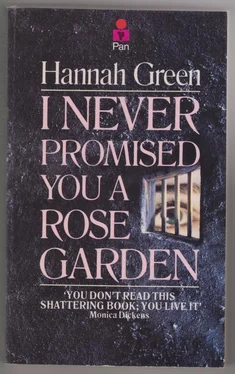“Then you’re not going to be indifferent …” Deborah said, walking very gingerly on the new ground.
“You’re damn right I’m not!” the doctor answered.
“Then I will tell you what no one knows,” Deborah said. “They never said they were sorry, not one of them. Not for going in so callously, not that they made me take all that pain and be ashamed of feeling it, not that they lied so long and so stupidly that their lies were like a laughing at me. They never asked my pardon for these things and I never gave it to them.”
“How so?”
“I never lost that tumor. It’s still there, still eating on the inside of me. Only it is invisible.”
“That punishes you, not them.”
“ Upuru punishes us both.”
“ Upu —what?”
Yr had opened suddenly, in horror that one of its guarded secrets had slipped into the earthworld, the sunny office with the booby-trap furniture. The language of Yr was a deep secret, kept always more rigidly away from people as it crept toward greater control of the inner voice. Upuru was Yr’s word for the whole memory and emotion of that last hospital day—that day after which all things had seemed to gray to dimness.
“What did you say?” the doctor was asking, but Deborah had fled, terrified, into Yr, so that it closed over her head like water and left no mark of where she had entered. The surface was smooth and she was gone.
Looking at her, drawn away from words or reasons or comforts, Dr. Fried thought: The sick are all so afraid of their own uncontrollable power! Somehow they cannot believe that they are only people, holding only a humansized anger!
A few days later, Deborah returned to the Midworld looking out on Earth. She was sitting with Carla and some others on the corridor of the ward.
“Do you have town privileges?” Carla asked her.
“No, but they let me go out when my mother was here.”
“Was it a good visit?”
“I guess so. She couldn’t help trying to get me to figure out what made me sick. We were no sooner sitting down when it came out in a big rush. I knew she had to ask it, but I couldn’t tell her—even if I knew.”
“Sometimes I hate the people who made me sick,” Carla said. “They say that you stop hating them after you’ve had enough therapy, but I wouldn’t know about that. Besides, my enemy is beyond hating or forgiving.”
“Who is it?” Deborah asked, wondering if it could only have been one.
“My mother,” Carla answered matter-of-factly. “She shot me and my brother and herself. They died; I lived. My father married again, and I went crazy.”
They were hard words, and stark, with no euphemisms such as one always heard outside. Starkness and crudity were two important privileges of the hospital, and everyone used them to the fullest. To those who had never dared to think of themselves, except in secret, as eccentric and strange, freedom was freedom to be crazy, bats, nuts, loony, and, more seriously, mad, insane, demented, out of one’s mind. And there was a hierarchy of privilege to enjoy these freedoms. The screaming, staring ones on Ward D were called “sick” by others and “crazy” by themselves. Only they were allowed to refer to themselves by the ultimate words, like “insane” and “mad,” without contradiction. The quieter wards, A and B, were lower on the upside-down scale of things and were permitted only lighter forms: nuts, cuckoo, and cracked. It was the patients’ own unspoken rule, and one learned without benefit of being told. B-ward patients who called themselves crazy were putting on airs. Knowing this, Deborah now understood the scorn of the rigid, dull-eyed Kathryn when a nurse had said, “Come on now, you are getting upset,” and the woman had laughed. “I’m not upset; I’m cuckoo!”
Deborah had been two months in the hospital. Other patients had come and some had gone up to “D” among the “insane,” and some to other hospitals.
“We’re getting to be veterans,” Carla said, “old hands at the funny farm.” And perhaps it was true. Except for “D,” Deborah was no longer frightened of the place. She did what she was told and apart from that wielder of horrors, Dr. Fried, in her innocent-looking white house, there was no mark of excessive caution put on anything by the Censor.
“How long is the time until we know if we’re going to make it or not?” Deborah asked.
“You kids are just in the honeymoon phase,” said a girl sitting near them. “That takes about three months. I know, too. I’ve been in six hospitals. I’ve been analyzed, paralyzed, shocked, jolted, revolted, given metrazol, amatyl, and whatever else they make. All I need now is a brain operation and I’ll have had the whole works. Nothing does any good, not this crap or anything else.” She got up in the very doomed, dramatic way she had and left them, and Lactamaeon, second in command of Yr, whispered, If one is to be doomed, one must be beautiful, or the drama is only a comedy. And therefore, Unbeautiful….
Kill me, my lord, in the form of an eagle, Deborah said to him in the language of Yr. “How long has she been here?” she asked Carla in the language of Earth.
“More than a year, I think,” Carla said.
“Is this … forever?”
“I don’t know,” Carla answered.
The winter hung around them. It was December, and outside the windows the tree limbs were black and stark. A group in the dayroom was decorating a tree for Christmas. Five staff and two patients—God, they tried so hard to make the madhouse look like home. It was all lies; their laughter hung very false among the ornaments (no sharp edges and no glass), and Deborah thought that at least they had the decency to be embarrassed. At the doctor’s house the dragging forth of her history, and the retreats, camouflaging, and hiding, went on. Except for her contact with Carla and Marion on the ward, she was drawing away from the world even the undervoice that answered questions and stood in place of herself when she wished to be in Yr. “I can’t describe the feeling,” she said, thinking of the Yri metaphors which she had used to tell herself and the Yri ones what she wished. In recent years thoughts often came, and happenings also, for which there seemed no sharer on the hard earth, and so the plains, pits, and peaks of Yr began to echo a growing vocabulary to frame its strange agonies and grandeurs.
“There must be some words,” the doctor said. “Try to find them, and let us share them together.”
“It’s a metaphor—you wouldn’t understand it.”
“Perhaps you could explain it then.”
“There is a word—it means Locked Eyes, but it implies more.”
“What more?”
“It’s the word for sarcophagus.” It meant that at certain times her vision reached only as far as the cover of her sarcophagus, that to herself, as to the dead, the world was the size of her own coffin.
“With the Locked Eyes—can you see me?”
“Like a picture only, a picture of something that is real.”
The exchange was making her terribly frightened. Because of it the walls began to thrum a little, vibrating like a great, blood-pumping heart. Anterrabae was reciting an incantation in Yri, but she couldn’t understand his words.
“I hope you are happy with your prying,” she said to the fading doctor in her chair.
“I am not trying to frighten you,” the doctor said, not seeing the walls writhe, “but there is still much to do. I wanted to ask you, since we had spoken about the tumor operations, how the world went gray suddenly after that, what the rest was like, the rest of those early years.”
It was difficult speaking to a half-present shape in the grayness outside of Yr, but there was an aching sense of loss and misery about the past and if this doctor could give a form to it, the memory might be easier to endure. Deborah began to pick through the happenings, and wherever she looked there was failure and confusion. Even at the hospital where the tumor had been so successfully removed those years ago, she had somehow not been equal to the game they were playing. Its rules had been lies and tricks and she had seen through them but had not known how to respond to the play—to fall in with it and believe. The convalescence had also been hypocritical, since the illness itself had not passed.
Читать дальше












